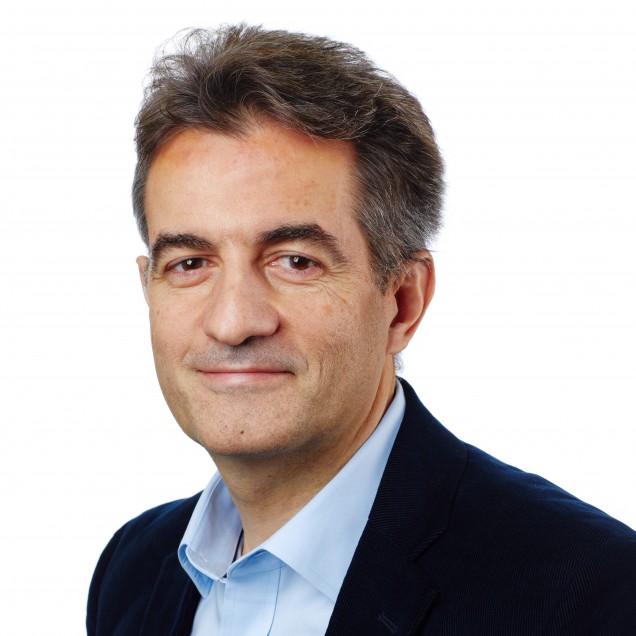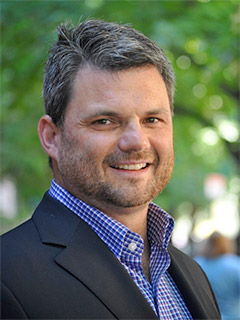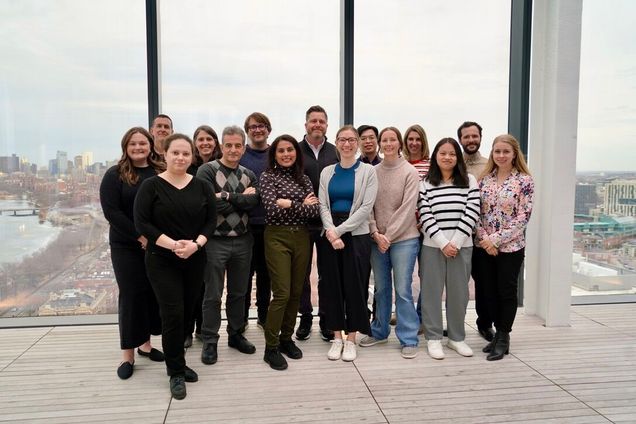Boston University Announces Task Force on Convergent Research and Education
Task force members include Hariri Institute faculty affiliates
Boston University President Melissa Gilliam, MD, announced the launch of the BU Task Force on Convergent Research and Education in a recent memo. Convergent research is a collaborative approach that goes beyond interdisciplinary research to solve specific, complex societal problems that require diverse disciplinary teams. In a convergent setting, teams work together in novel ways, combining their knowledge and methods to create new approaches—with the potential to form new fields entirely.
Building upon our University’s strong foundation in high-impact, cross-disciplinary collaboration,“the task force will be charged with making recommendations on how to best adopt convergence, University-wide and within individual schools and colleges,” wrote Gilliam. “This effort will further our ability to make transformative contributions to society, remain highly competitive for external funding for our research and educational programs, excel in educating the future workforce, and continue attracting intellectually fearless and ambitious faculty and students to our University.”
Led by co-chairs Ken Lutchen, Senior Advisor to the President, Dean of Engineering, Emeritus, and Professor (BME), and Darrell Kotton, Professor of Medicine and Director of the Center for Regenerative Medicine, the task force includes several members of the Hariri Institute community, including: Director Yannis Paschalidis, Distinguished Professor (ECE, SE, BME) and Founding Professor of Computing and Data Sciences; Steering Committee members Benjamin Sovacool, Professor of Earth & Environment, and Lucy Hutyra, Distinguished Professor of Earth & Environment; and Faculty Affiliates David Boas, Distinguished Professor of Engineering (BME, ECE), and Kevin Gallagher, Professor of Global Development Policy.
-

Ioannis (Yannis) Paschalidis
Director, Hariri Institute;
Distinguished Professor, Electrical and Computer Engineering, Systems Engineering, and Biomedical Engineering;
Founding Professor, Computing and Data Sciences -

Benjamin Sovacool
Director, IGS
Professor, College of Arts & Sciences, Earth & Environment -

Lucy Hutyra
Distinguished Professor of Earth & Environment, Earth & Environment (CAS)
-

David Boas
Distinguished Professor, Engineering (BME, ECE)
Director, Neurophotonics Center -

Kevin Gallagher
Professor, Global Development Policy (Pardee)
Director, Global Development Policy Center
Objectives of the BU Task Force for Convergent Research and Education include:
- Determine how to position BU so we remain a leader in convergent research, including gathering information about effective practices adopted at peer institutions and developing strategies for identifying new and emergent areas for convergent research and education
- Identify current organizational barriers to convergent research and teaching that can be removed to make it easier for researchers from different fields and across our campuses to collaborate effectively
- Recommend key investments from Boston University and external partners to catalyze success in convergent research and education
- Determine best approaches for recruiting new talent and developing current faculty
- Examine the role convergence should play to enhance undergraduate and graduate educational programs and better prepare graduates to embrace the power of working across disciplines
- Identify metrics, short- and long-term, that could be used to measure and track success of our efforts over time
Paving the Way Toward Convergent Research
The Hariri Institute’s Focused Research Programs (FRPs) exemplify the growth of convergent research at Boston University. FRPs facilitate research convergence by providing “scaffolding” for faculty-driven efforts in multi-disciplinary teams to coalesce in sustainable ways, with the goal of accelerating research for future funding and broader impact. FRPs aim to evolve and advance Boston University’s research in computing, computational, and data-driven science and engineering around areas of strategic importance and emerging opportunity.
The Hariri Institute’s FRPs have opened the door for convergent research efforts in diverse fields spanning quantum computing, health, climate change, and more—contributing to Boston University’s position as a leading global research institution. Explore notable examples below.
Quantum Convergence
 Led by Andrei Ruckenstein, Professor of Physics, the goal of the “Quantum Convergence” FRP was to launch broad conversations and collaborations across BU to reveal cross-cutting themes around quantum science and engineering—making BU well-positioned to lead and collaborate in large-scale research projects. The FRP examined current challenges in quantum chemistry, the realization of novel quantum states of matter, limitations of quantum computing, opportunities in quantum sensing, and quantum communications networks.
Led by Andrei Ruckenstein, Professor of Physics, the goal of the “Quantum Convergence” FRP was to launch broad conversations and collaborations across BU to reveal cross-cutting themes around quantum science and engineering—making BU well-positioned to lead and collaborate in large-scale research projects. The FRP examined current challenges in quantum chemistry, the realization of novel quantum states of matter, limitations of quantum computing, opportunities in quantum sensing, and quantum communications networks.
This effort helped launch the BU Quantum Science & Engineering Consortium (QSEC) in September 2024. QSEC is a university-wide initiative that was created to identify areas of excellence and opportunities for targeted joint hires across departments and colleges with significant existing research programs in Quantum 2.0 sciences.
Through these efforts, Ruckenstein along with Professors Ran Canetti, Computer Science (CAS), and Claudio Chamon, Physics (CAS), received a $2.8M NSF Growing Convergence Research award. The award aims to accelerate the development of trusted, low-overhead tools for computation on hidden data that increases the public’s trust in modern AI tools and creates new opportunities for data-powered, socially responsible innovation.
BEACON

The Biothreats Emergence, Analysis and Communications Network (BEACON) is another example of convergent research that started as a Hariri Institute FRP. In 2022, Paschalidis teamed up with Nahid Bhadelia, MD, Founding Director of the Boston University Center on Emerging Infectious Diseases (CEID) and Associate Professor of Medicine, Infectious Diseases, and Diane Joseph-McCarthy, PhD, Executive Director of the Bioengineering Technology & Entrepreneurship Center and Professor of the Practice (BME, Chemistry, MSE), along with other researchers to create an FRP titled “Predicting and Preventing Epidemic to Pandemic Transitions.” Together, they sought to develop a comprehensive strategy and the required science base for predicting and preventing future pandemics—leading to the formation of BEACON.
Based at Boston University’s CEID and operated in partnership with the Hariri Institute and HealthMap at Boston Children’s Hospital, BEACON seeks to become the only open-source global surveillance platform of its kind—rapidly and transparently sharing data and contextual knowledge about new threats with public health authorities, practitioners, researchers, and the general public. By providing early warnings of sentinel cases, clusters, and outbreaks, BEACON will enable early public health response.
Health Equity in the Wake of Continued Climate Change
Hutyra is an environmental ecologist whose research includes investigating the impact of urban forests on climate change, work that won her a MacArthur “Genius Grant” in 2023. In her FRP, “Health Equity in the Wake of Continued Climate Change,” she partnered with Gregory Wellenius, Professor of Environmental Health and Director for the Center for Climate and Health, to expand cross-campus collaboration on climate and health research at BU. The FRP was co-sponsored by the Hariri Institute and the Institute for Global Sustainability.
As reported in The Brink, Hutyra’s work has attracted the attention of local officials, who encouraged her to explore if there’s a way to predict which law changes could provide the most impact to the environment. By collaborating with experts in the BU community and external public health researchers, Hutyra’s research continues to evolve and expand.
Novel Data Science and AI approaches for Brain Health and Brain Disease
In 2023, Boas, an expert in neurophotonics, fNIRS, biomedical optics and physiological modeling, partnered with Swathi Kiran, Professor of Speech Language and Hearing Sciences, Margrit Betke, Professor of Computer Science, and Prakash Ishwar, Professor (ECE), to lead the “Novel Data Science and AI Approaches for Brain Health and Brain Disease” FRP.

The project brought together researchers and faculty across the BU campus, including clinicians, neuroscientists, engineers, biostatisticians, computer scientists, and data scientists to explore continuous brain monitoring, brain fingerprinting, and digital health.
The FRP also facilitated collaboration with the Neurophotonics Center to develop noninvasive neuroimaging technology that continuously tracks human brain function and behavior in real time. This was built on an NIH grant titled “The Neuroscience of Everyday World”—a novel wearable system for continuous measurement of brain function. Additional collaborations with the FRP team have extended this work to participants with dementia.
Research efforts like these are just the beginning of convergent research at Boston University. Read more about The Boston University Task Force on Convergent Research and Education and university-wide convergent research projects in The Brink story.
